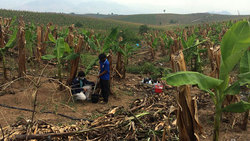RFA | 28 May 2020
Banana farms in Laos sicken villagers, even as they provide steady work
China-invested banana plantations in Laos are sickening Lao villagers exposed to agricultural chemicals, but also provide an income for the communities in which the farms are placed, according to sources in the one-party communist state.
Villagers working on the farms become weak and tired after only two or three years working on the farms, and often suffer from chronic headaches and dizziness believed to be the result of exposure to chemicals, an official working for the Ministry of Natural Resources and Environment told RFA’s Lao Service.
“Some villagers also fall sick and are hospitalized, and a woman in one village has been sick for two or three years after working on a banana plantation,” the official, who researches the impact of banana farms in northern Laos, said.
“Many of them tell me they will leave the farms after they become too tired, and will look for other work to do once they have earned a certain amount of money,” he said.
Some villagers also make money by leasing land directly to the Chinese companies running the plantations, adding to what they can earn by working on the farms, he said. “They can earn as much as 20 million kip [U.S. $2,224] or 30 million kip [U.S. $3,337] per year. It all depends.”
The Lao government has issued guidelines aimed at guaranteeing the farms will now be run on safer lines limiting the use of chemicals, “but it is still challenging to apply these in the banana plantations in our country,” the official said.
Concerns over chemical run-off from heavily polluting Chinese-owned banana plantations led in January 2017 to government orders forbidding new banana concessions, though many farms were left to operate under contracts valid for several more years.
However, that ban was lifted the following year in order to attract investment to the landlocked and cash-strapped country.
It was a mistake to allow the banana farms to resume operations, said one Lao agricultural expert working in the country’s north as a consultant for the United Nations Development Programme.
“This was not a wise decision, because we know very clearly that while work on the plantations provides a short-term income, the farms have a severe impact on the environment and on the health of [nearby] communities,” said the source, who declined to be named in order to speak freely.
It is almost impossible now to enforce measures mandating good agricultural practice and limiting the use of chemicals, the expert said.
“The legislation and policies are good, but as we all know enforcement in Laos is very weak. If officials inspect for the use of chemicals on the plantations, the investors just give them ‘white envelopes’ [containing bribes] in exchange for their approval.”
'The problem is the chemicals'
Banana farming employs many people in the rural areas of Laos, said an Australian expatriate conducting research on banana farms in Bokeo province in the country’s north.
“Bananas employ at least one person per hectare, with a husband-and-wife team normally looking after three hectares, and then there are all the other workers who carry bananas and are employed in nurseries and planting,” he said.
“So 100 hectares will provide work for 100 people full-time.”
The problem is the chemicals, he said.
“The government has got better at managing this over the years, but it is still difficult to monitor. Some districts do better than others; some companies are more respectful of the rules than others.”
“But it is not easy to work with Chinese, and many workers also don’t like to protect themselves,” he said.
Illnesses and deaths have long been reported among Lao workers exposed to chemicals on foreign-owned farms, with many suffering open sores, headaches, and dizzy spells, sources told RFA in earlier reports.
Chemical run-off from farms has also polluted many of the country’s water sources, killing fish and other animals and leaving water from local rivers and streams unfit to drink, sources say.
Reported and translated by Ounkeo Souksavanh for RFA’s Lao Service. Written in English by Richard Finney.














